Boyzone’s Shane Lynch talks demons, deliverance and working his way back to the light
Shane Lynch has coined a word for his bad boy years : “Shaneanigans”. The Boyzone singer spent much of his 20s – between concerts and autograph signings – drinking, swearing and getting into scraps. It was the 90s, after all.
Around that time, he also became fascinated by the occult, the evidence of which is still visible in the tattoos etched on his skin. This “anti-God, anti-Christ” season became a problem when Lynch later became a Christian, so he added more ink to alter the meanings. The 47 year-old tells me that while fame has had many benefits, being on stage in front of 20,000 screaming fans was exceptionally lonely at times. He often missed the rhythm and routine of home.
Lynch grew up in a Catholic family in the Dublin suburb of Donaghmede. He was one of six siblings and the only boy; several of his sisters went on to form the girl group B*Witched. Lynch’s dyslexia, which went undiagnosed for years, made academic achievement seem impossible, and he tells me he cheated his way through school. He now sees neurodiversity as an asset, but it took a long time to recognise he had “a skill-set beyond the classroom”.
As a teenager, Lynch poured his energy into athletics and BMX racing: two things that came naturally to him. At one point, he looked set to follow his dad into business as a car mechanic – until a friend invited him to form a band: “It’s gonna be this boyband thing. Have you heard of Take That?”
Thus began an X Factor-style hunt – with new manager, Louis Walsh – for the other members of Boyzone: Ronan Keating, Stephen Gately, Keith Duffy and Mikey Graham. The “boys”, as Lynch calls them, would go on to achieve six UK number one singles and five number one albums.
Boyzone split up in 1999 after personal differences drove a wedge between the five – “realistically, what we needed during that time was a break”, says Lynch. They regrouped in 2007 but, two years later, tragedy struck when Stephen Gately suffered pulmonary oedema and died. Lynch has previously spoken about how painful it was to lose his close friend.
On the day of our interview, Lynch arrives 45 minutes late. It’s not due to self-importance or celebrity (he apologises at least three times for keeping me waiting), but I can’t help wondering whether him going to Camden rather than Cannon Street has anything to do with the dyslexia that makes life a lot less simple for so many people. Lynch chooses to view the mix-up through the lens of spiritual attack, however: the “enemy tries to take you from something great…it was such a battle to get here”. He sees most things in these terms now that he is born again. With the same gusto he poured into his before-Christ days, Lynch is wholly passionate about his faith. Rumour has it he no longer listens to secular music and he tells me that every day is now “about Christ”.
During our hour together we cover a range of topics – from his childhood to his years in Boyzone; his views of the music industry to his foray into reality TV – but Lynch becomes most animated when we talk about Jesus. He has been a Christian for 23 years but says his hunger for God has grown in recent times. He wants nothing more than to use his platform to reach people with the gospel (albeit in a non-preachy way). The only problem is that, four months ago, he vowed to give up all things showbusiness – “for me that was all interviews, all TV shows, all music stuff”. Yet here he is speaking to me, a journalist, and preparing for an upcoming Sky documentary about his time in Boyzone. I get the impression that Lynch spends a lot of time asking God if he’s on the right track and feeling the pull of different priorities. Because ultimately, if you strip away the fame and fortune, Shane is simply a man trying to figure out God’s purposes for his life.
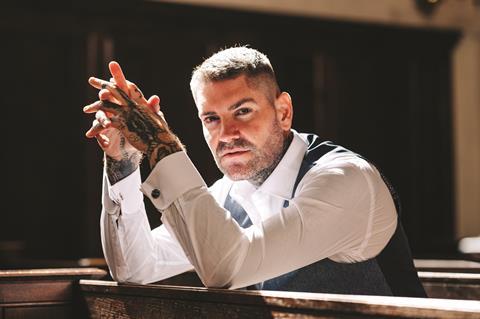
What are some of the standout moments from your time in Boyzone?
The journey itself was incredible, and still continues to be, if I’m honest. I’m 30 years in the music industry, and it has never left me, to the point where I still walk down the street [and get noticed]. You can’t just turn the tap off and go: “OK, I’m out. I’m not doing this stuff anymore.”
I remember Michael Jackson sitting in the front row of a Boyzone concert. He came to Dublin [to see us] because he bought the rights to the Bee Gees music and we’d done a cover of [their song, ‘Words’]. He came to see who was making them all the royalties. Singing ‘Words’ with the Bee Gees on TV [was also a highlight], singing with Pavarotti…you know, ‘the greats’ of the music world. I shared a stage with them!
The 90s was such a beautiful time in music. Such an innocence…it wasn’t sexualised the way the music industry is today. From the Spice Girls to Boyzone to Take That to Westlife…it was a gorgeous time in music. And the travel was mind-blowing, looking back on it. From the Middle East to the Far East to Australia…globally, we spread our wings for seven years or so.
I’ve been in rooms – at the top of the top – where albums are prayed over demonically
You’ve talked in the past about some of the harder parts of that journey. You started drinking, swearing on camera and fighting with Puff Daddy, of all things…
Shaneanigans. [laughs]
That’s one word for it. What led to that behaviour?
The [music] industry is destructive – let me take it straight to God and to the spiritual world. We have the Holy Spirit that guides us and protects us in the name of Christ, but the demonic side of the music industry is very real too. That’s how I came to God; through understanding the demonic side.
I was certainly interested in being mysterious; it gave me a character, it gave me some substance that I could hold on to. Why I portrayed myself in those ways I don’t know – maybe I was trying to prove something. But it intrigued me, the darker side of the world. Ouija boards, séances, tarot card reading, all that kind of spiritual stuff really got hold of me. That all came from our very first album launch; it was a Halloween party in a big mansion, but that was super demonic. We were just young kids, [and we thought]: It’s a bit of fun. All the record company and the journalists are there, and here we go. Not all music is bad, but the majority of it is [designed] to take you away from Christ, 100 per cent.
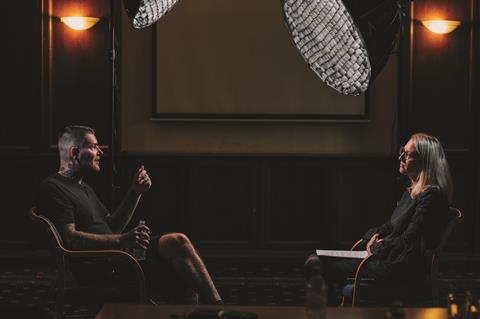
Do you mean in terms of the lyrics or the big players in the industry?
Both. Lyrically and big players. I’ve been in rooms – at the top of the top – where albums are prayed over demonically. Music is prayed over demonically that goes out to the radio stations, to the public. When you see that stuff, it’s frightening.
What do you mean by “prayed over demonically”?
Rituals, ceremonies, everything to give light to the devil, to Satan. It’s a satanic music industry.
Do you mean figuratively, or literally?
Literally. Yes.
Can you share what those albums were? Were they your albums?
No, they were not Boyzone albums, so that’s what I mean by not all music is [like] that.
If you look at what the industry is today: your Sam Smiths to your Dojo Cats to your Beyoncés, they are so demonic it’s unbelievable. And it’s in front of us. We kind of go: “Oh, it’s just music.” But it really isn’t. It’s absolutely taking over the world, taking over our children and taking over everything.
Are you talking about the messages that are in those songs?
Yeah, messages, and the glorification of Satan. That’s what they’re doing, they’re glorifying Satan.
I WAS IN A SPIRITUAL BATTLE BUT LUCKILY I KNEW I HAD A STRONGER WAY IN CHRIST
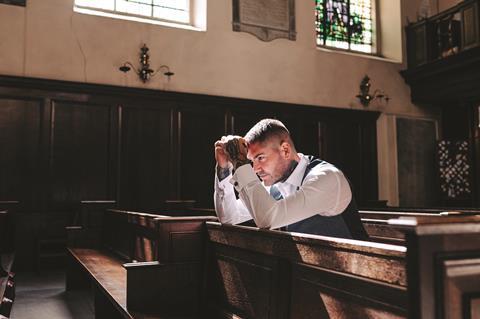
In your autobiography you talk about demonic activity in your own life – being locked in your body and having demons breathe in your ear, levitating beds…it’s pretty out there. What do you say to people who don’t believe in those things?
I’d say the devil is doing a great job of diverting you, and Hollywood is doing a great job of it, too. Because that’s what it’s there to do: to make you think it’s all nonsense. And if you think it’s all nonsense, then the devil’s laughing. It’s very real. If you’re a Christian and you understand the Bible, the Bible talks about demons, that means it’s real. Just because you’ve never seen it – and I wish you never do – you still have to understand that it’s biblical.
Luckily for me, it’s how I found God. I knew the dark so well, I knew [demons] were real, I hung out with them, which means: If you’re real, surely God is real. And that’s how I got out of where I was.
Let’s talk about that. How did you go from being involved in the dark side to then becoming a Christian?
That path looked like a super good friend of mine, Ben Ofoedu. I’ve known him since the mid-90s. He was in multiple different bands at the time.
His knowledge of the Bible was incredible and he just broke down parables for me and broke down scenarios in my life. The more I listened to him, I just found myself being drawn to the light, to Christ…And the more I got into it, the more I started to make changes. I went back to church – a Catholic church – and I just sat at the back by myself. What fascinated me was that it wasn’t empty, it was full of families. I spent the hour looking at people, at why they were there and what they were getting from it. That’s what intrigued me.
I started to go to a Bible study on a Wednesday [at The Tab church in London]. I wasn’t quite brave enough to enter the realm of Sunday church, but my mind was blown. What I was receiving, what I was hearing, what I was getting from the word was so incredible. But I will say, the demonic attacks at that time were massive.
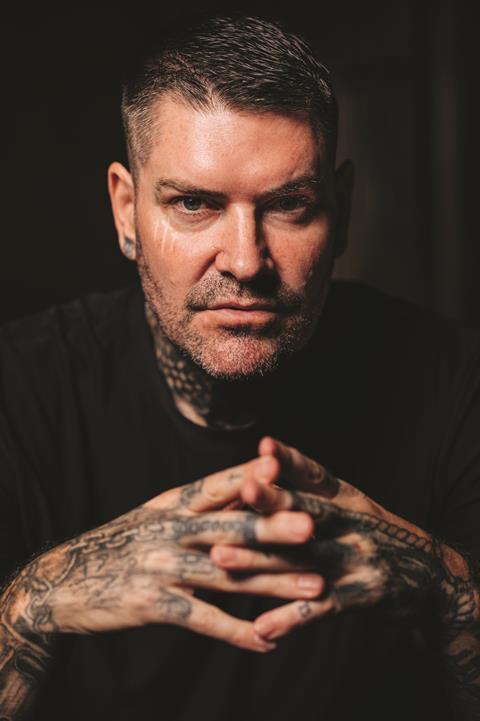
Can you give us some examples of what happened?
I think the pull between the two [spiritual realms] got real, and the visitations got more, and the timing of visitations. I know that is quite dark for a lot of people: What do you mean [by] a visitation? I mean spirits visually in my room. And the torment and the torture, the mental annoyance – the chattering of the teeth as they talk in hell, if you want to call it that – it’s very real. It became this spiritual battle for me. Luckily, I knew what was right, and I knew I had a stronger way in Christ. Although I wasn’t born again yet, I knew I needed to go that way.
Was there a point for you when you gave your life to Christ and things changed?
It’s not that things changed, it’s that you have to change. I think that’s the confusion for a lot of people. They think there’s a switch [when you become a Christian]: Now I’m different. No. This is your beginning, this is your journey, this is your birth, this is how you’re going to make the steps to be right, to be better, to be more Christ-like. You’re still you, of course, but now what you have inside you – the ability to change – is very different. You have Christ on your side, the Holy Spirit is on your side, so you just have to start tuning into that. We all make those decisions, you know?
The journey is so beautiful when you become born again. It really is. The realisation that there is something else in life. Recently, I have been kind of tiptoeing around my journey – you know, 23 years of God – how much of that have I utilised? How much have I given of my time to God to build my relationship [with him]? I am ashamed of myself, because I haven’t given enough, and that is absolutely my fault. I know Christ and I have authority to know him more and I don’t do enough about it. I’ve changed that in the last year or so, but that 20-year period? I did not practise enough. I did not bring in the word of God enough.
My deliverance was being filled with the Holy Ghost AND SPEAKING IN TONGUES
When you became a Christian, did you find that the demonic stuff stopped overnight?
No. It still hasn’t stopped. There’s still a battle out there. I still live in the world, I’m still on this earth, and on this earth is a lot of evil. I just have to stay in Christ, and the more I stay in Christ, the more I can be stronger against the principalities and the forces that are against us.
I have spoken to quite a few people who have become Christians, and needed deliverance ministry in order to move forward. Was that the case for you?
Everyone’s journey is different. I wouldn’t say I was delivered in terms of a possession scenario, but my deliverance was being filled with the Holy Ghost and speaking in tongues. That is my strength. As I continue in the word and continue with Christ, I just recognise the dark side of everything, and it’s [through] recognition that I can see [a way to] manoeuvre through. There will always be a battle. Christ himself was brought to the point where he had to make a choice. And if the devil could come and chat to Christ, he’s definitely gonna come and chat to us. We’re not delivered from that at all.
To hear the full interview listen to Premier Christian Radio at 8pm on Saturday 14 October or download ‘The Profile’ podcast




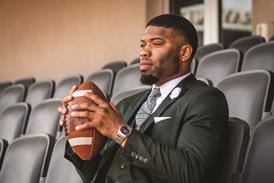









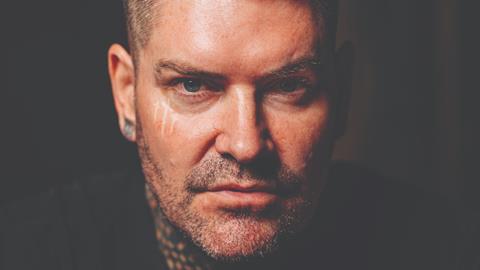

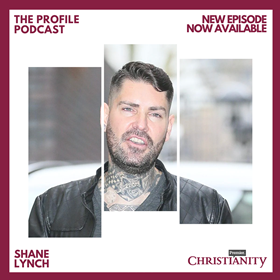
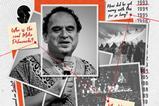






















No comments yet